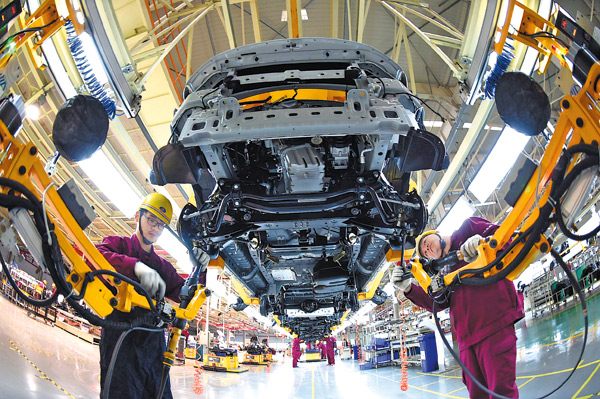 |
|
Workers assemble new cars at a production line at JAC Motor's plant in Bozhou, Anhui province. LIU LIQIN / FOR CHINA DAILY |
Old and new players join ranks to take the field in the largest autos market
China's carmaking industry, since the first-ever truck rolled off the production line in 1956, has never been so full of vitality-and uncertainty.
In less than a year, the authorities have given the nod to 14 companies to build electric car-building plants, and more are waiting for approval or preparing their applications.
All of them want to seize a slice of the electric, connected and autonomous car industry, something that both new startups and traditional car giants are convinced will eventually come.
None of them have a clear, whole picture of the industry's destination yet, nor how to arrive there.
But, there is a growing consensus that cooperation could prove to be their best collective weapon, at least in the current climate, according to executives at the ninth China Auto Blue Book Forum organized by the Automotive Business Review magazine. Nio, which was formerly known as NextEV, has not won approval from the authorities to build its cars. But its first model-an electric 7-seat SUV-is about to roll off the assembly line at one plant of JAC Motor, a traditional carmaker in Anhui province.
The arrangement is part of a 10 billion yuan ($1.45 billion) deal the two signed last year relating to new energy and smart cars, as well as connectivity technologies.
William Li, founder of Nio, said the two companies are working closely on many aspects, ranging from material purchases to quality control. "It is not 'they produce for me'; it is thorough cooperation."
Earlier last month, Nio inked a deal with another traditional carmaker, Changan Automobile, which also centers on new energy and connected cars.
The two plan to build a joint venture that focuses on research and development in that area as well.
Nio is not worried that cooperation with potential rivals may pose dangers.
In fact, Li believes that startups' hopes of succeeding in the market do not rely on how good their cars are, but their understanding of customer experience.
"Producing good cars is the prerequisite for selling cars, but what makes the difference is offering customers good service."
He argued that traditional carmakers are often more focused on manufacturing and they have a business-to-business model through their dealers, while new forces are more likely to provide better services directly to customers.
Xu Heyi, chairman of BAIC Group, which has joint ventures with Hyundai and Mercedes-Benz, said those startups will not replace traditional automakers. But, he agreed that cooperation is indispensable in the age of a more complicated market.
"All roads lead to Rome, although every road is different. However, if traditional automakers and new ones can work together, with each bringing their strengths to the table, we can create a shorter and faster road. And this is better than if they were to each travel their own road."
BAIC is not limiting its cooperation to the car sector. It is also leveraging internet companies' resources to sharpen its competitive edge.
"We must collaborate and cooperate, especially with leading internet firms. All resources available should be fully utilized," said Xu.
In January, BAIC announced a strategic partnership with Baidu to expand the smart vehicle sector. Under the agreement, the companies will cooperate on autonomous driving technology, including high-definition maps.
Baidu and BAIC also plan to launch a research lab to promote technological collaboration and the mass application of intelligent vehicle technology.
Xu expects the results of this collaboration to start to pay off within two or three years.